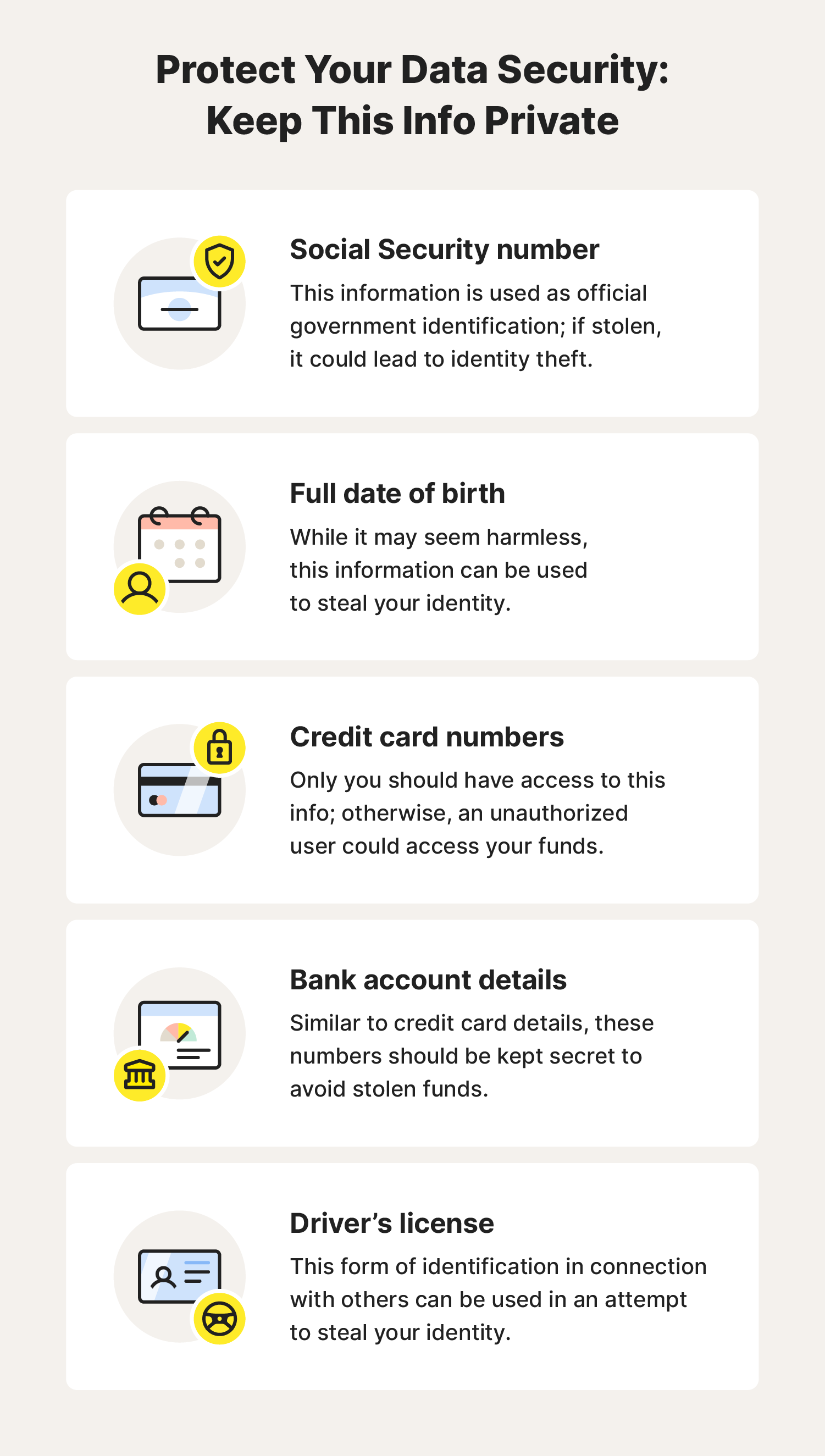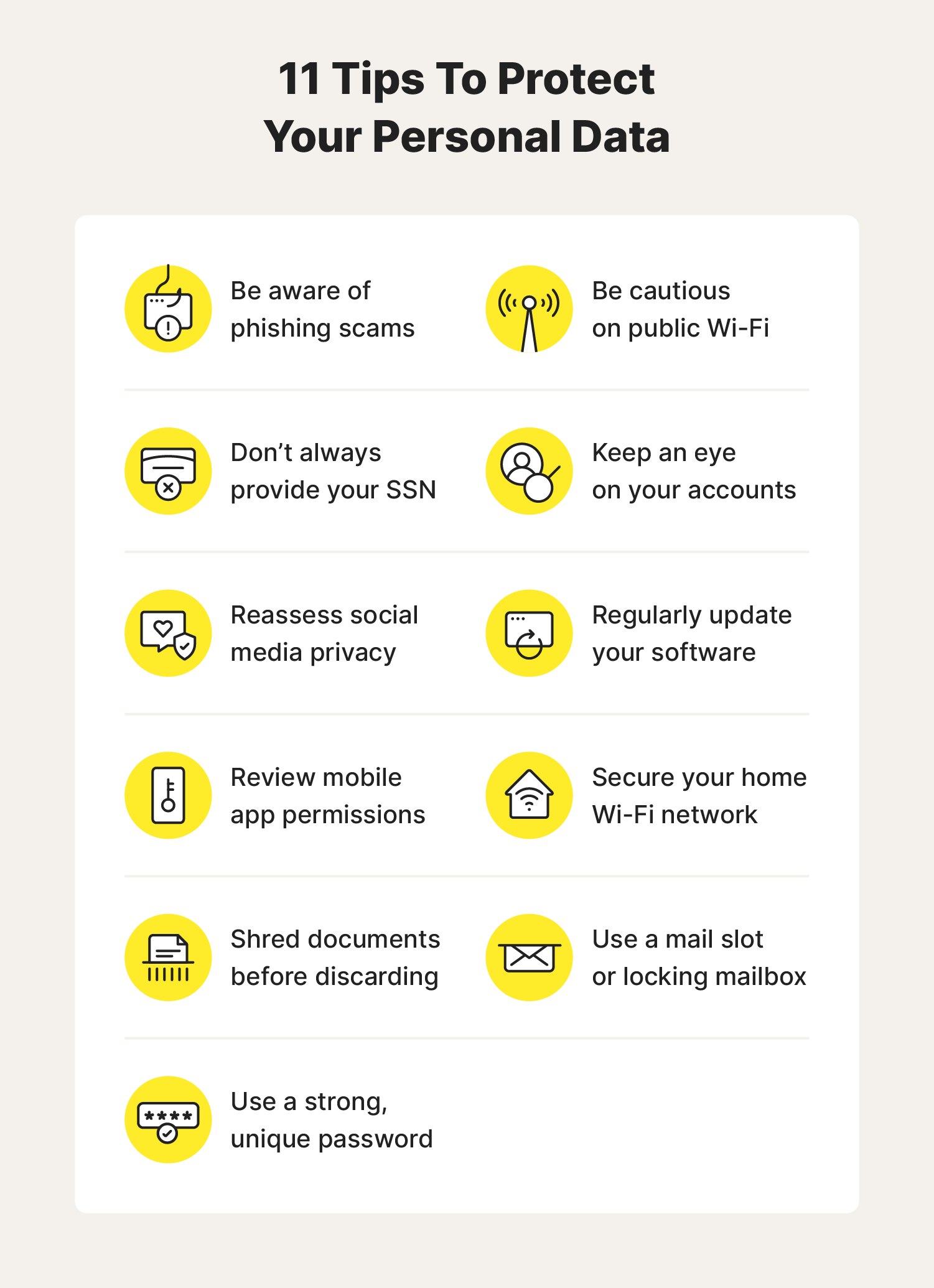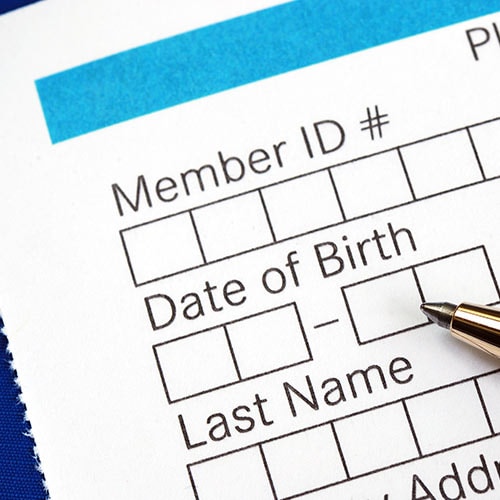When it comes to data privacy, it's easy to think it's someone else's responsibility, like the companies that store our information. But in reality, protecting our data is up to us. Our proactive steps—not just relying on others—are what keep us safe. The more we understand best practices around data privacy, the better we can protect ourselves from potential risks.
What is data privacy?
Data privacy is the principle that individuals control how their personal information is collected, managed, and shared by others with access to it. In the digital age, data privacy usually refers to handling critical personal information, also known as personally identifiable information (PII) and personal health information (PHI).
In practice, data privacy comes down to how a piece of information—or data—should be handled based on its relative importance. You likely wouldn’t mind sharing your name with a stranger when you introduce yourself, but there’s other information you wouldn’t share, at least not until you become more acquainted with that person.

For instance, you wouldn’t casually share your Social Security number, medical records, or financial details. Even basic yet sensitive information, such as your full name, address, and birthdate, is typically kept private. However, when opening a new bank account, you expect to provide a significant amount of personal information, far beyond just your first name.
For a business, data privacy goes beyond the PII of its employees and customers. It also includes the information that helps the company operate, whether it’s proprietary research and development data or financial information that shows how it’s spending and investing its money.
Why is privacy important?
Data privacy matters because mishandling personal information can lead to significant harm to individuals and organizations. For example, if a government agency fails to protect citizens' PPI, that data could be exposed to unauthorized parties, leading to identity theft or financial fraud.
Likewise, a violation at a corporation could result in a data leak or put proprietary data in the hands of a competitor. And at a hospital or doctor’s office, improper sharing could put extremely sensitive PHI in the hands of those who might misuse it.
Privacy is not only a practical concern but also a fundamental human right, much like free speech. While businesses play a crucial role in protecting customer data, individuals must also take responsibility for monitoring and safeguarding their personal information—and deciding who to entrust it with.
Data privacy vs. data security
Data privacy differs from data security in that data privacy focuses on how personal information is collected, used, and shared, while data security refers to protecting data from unauthorized access or breaches.
For example, a social media platform’s data privacy policy outlines how your profile information is used and with whom it’s shared. Meanwhile, its data security policy focuses on encrypting that information and restricting access to it, helping to safeguard your data from hackers.
10 data privacy terms you should know
Here are the most important data privacy terms and concepts that you should know to help you better understand how organizations handle your data—the first step to taking control of your information:
- Access control: control that determines who can access your data
- Anonymization: a process that removes identifiable info from your data
- Data breach notifications: notifications received when your data has been compromised
- Data deletion requests: formal requests to delete your data
- Data minimization: storing only necessary data to prevent risk
- Encryption: converting data into code to better secure it
- Opt-in/opt-out options: the option to allow or disallow collection of data
- Privacy policies: details on how an organization uses and stores your data
- Right to access and correct data: the ability to view and modify your data
- Two-factor authentication: security process requiring two forms of identification
Data privacy laws that help protect you
Many countries have passed laws and regulations governing how organizations collect, store, use, and share personal information. In the United States, the Health Insurance Portability and Accountability Act (HIPAA) regulates healthcare providers' use and disclosure of protected health information.
Similarly, the General Data Protection Regulation (GDPR) in the European Union provides a framework for handling and storing individuals’ data. GDPR inspired the California Consumer Privacy Act (CCPA), which provides comparable regulations for businesses collecting information from California residents.
Fair information practice principles
Fair information practice principles (FIPPs) are widely used principles that guide the collection, use, and dissemination of personal information. Established in 1980 by the Organisation for Economic Co-operation and Development (OECD), they have since become an informal standard for how organizations handle personal data.
The FIPPs are as follows:
- Access and Amendment: Individuals have the right to access their data, to have it corrected or amended, and to know who has access to it.
- Accountability: Those who collect personal data must be responsible for following these principles, providing reassurance and confidence in the system.
- Authority: Only agencies who have the authority to collect, process, or store data should do so, and they should make this authority clear in an appropriate notice.
- Minimization: Personal data collection should have limits, and agencies should collect, process, and store only the personal information that is relevant and necessary to the task.
- Quality and integrity: Personal data must be accurate and relevant to its intended purpose, and agencies should ensure fairness to the individuals whose data is concerned.
- Individual participation: Agencies should involve individuals about the collection and use of their data, seeking consent and empowering them to make informed decisions.
- Purpose Specification and Use limitation: The purpose of collecting personal data must be explicitly stated, and agencies should use, process, or store data only for those purposes that are explained or legally authorized.
- Security: Personal data must be kept secure. Agencies should create adequate administrative and technical safeguards to protect PII from unauthorized access or exposure.
- Transparency: Agencies should provide clear and accessible information regarding their PII policies.
7 common data privacy challenges
It’s natural to want to stop your data from falling into the wrong hands, but that isn’t always easy. One of the difficulties is the variety of ways your data can be accessed or tracked. Here are some of the most common challenges people face.
1. Confusing social media privacy settings
Social media platforms and other online services often have complex privacy settings that can be difficult for users to understand and navigate. It isn’t always clear what’s private or not, and this lack of clarity can have dangerous consequences, including social media identity theft.
2. Online tracking and website cookies
Many websites and apps use cookies, web beacons, and other tracking technologies to collect data about users' online behavior, typically with user consent. However, users may not always realize that their activities are being tracked or that their data is shared with third parties. To enhance privacy, consider using anti-tracking tools like secure browsers or VPNs for sensitive activities such as online banking.
3. Phishing scams and social engineering
Phishing scams are a common way for hackers and scammers to trick users into sharing their personal information. Phishing emails and websites may look legitimate, but they're designed to steal sensitive information, such as login credentials or credit card numbers.
4. Lack of control over third-party data sharing
Even if users take steps to protect their data, they may have little control over how third-party companies handle their information. For example, if a user shares information with an online retailer, that retailer may share the information with other companies for marketing purposes.
5. Data breaches and cybercriminal activity
Data breaches can have severe outcomes for individuals. When unauthorized individuals access your data, they may be able to impersonate you, leading to financial losses, legal issues, and emotional distress.
6. Invasive data collection by applications
Understanding how apps use your data is crucial. Many apps collect more information than necessary, increasing the risk of misuse. Review agreements carefully before accepting them to ensure you know how your data is used and what access may be granted to third parties.
7. Default options that favor data collection
When signing up for a new service or downloading an app, the default settings are often set to collect more data than you might prefer. Whether setting up a new computer or installing software, don’t automatically agree with pre-checked options. Instead, read and understand how your data is collected and used to ensure your privacy is protected.
Tips to help protect your personal data
Data privacy matters. That's why many government organizations and corporations spend so much time and money each year to help protect the data under their control—which could include your PII—from exposure.
The average consumer doesn't have that kind of money to spend. However, there are simple steps you can take to help protect your personal information and shore up your data privacy.

- Be aware of phishing scams: Bad actors may try to impersonate people to gain knowledge from unsuspecting victims.
- Be cautious on public Wi-Fi: Avoid sensitive activities like banking unless you’re using secure network connections or privacy tools like a VPN.
- Safeguard your Social Security number: If someone asks for your SSN, determine why they need it and how they'll help protect it.
- Keep an eye on your accounts: Log into your accounts regularly and monitor for suspicious activity.
- Regularly reassess social media privacy: You may be unknowingly sharing more details than you’re comfortable with.
- Regularly update your software: Updates will help eliminate security vulnerabilities.
- Review mobile app permissions: Be aware of the level of access your apps have on your phone—to your mic, camera, GPS, etc. Don't just say “yes” to everything.
- Secure your home Wi-Fi network: Use a firewall and other cybersecurity tools to help prevent criminals from eavesdropping on your online activity.
- Shred documents before discarding them: Safely dispose of receipts, bank statements, credit card statements, and personal information.
- Use a mail slot or locking mailbox: This will help ensure thieves can't steal mail that may contain sensitive information.
- Use a strong, unique password: Add multi-factor authentication for enhanced password security.
- Use a reputable identity theft protection service: LifeLock includes the built-in Privacy Monitor feature that scans common people-search sites and public data brokers for your information, and then helps you remove it for greater control over your personal details.
Help protect your identity with LifeLock
If you’re serious about your data privacy, LifeLock Total provides a powerful privacy monitoring service and reliable identity theft protection that helps you take the steps you need if your personal info is exposed, your Social Security number is used suspiciously, or your wallet is stolen. Take control of your digital identity today.
FAQs about data privacy
Do you have questions about your data privacy? We're here to guide you by answering the most frequently asked questions we receive.
What is data privacy and security?
Data privacy refers to the protection of personal information from unauthorized access and misuse. Data security involves the measures and practices used to safeguard that information from breaches, theft, or loss. Together, strong data privacy and security helps ensure that individuals' data is stored safely and used responsibly.
Why is data protection so important?
Data protection is crucial because it helps prevent personal information from misuse and unauthorized access. Ensuring data privacy helps maintain trust, safeguard personal freedoms, and comply with legal regulations, ultimately securing individuals' control over their own information.
What is the problem with data privacy?
Data privacy issues arise when personal information is collected, stored, or shared without proper consent or protection. This can lead to unauthorized access, identity theft, and misuse of sensitive information, undermining trust and potentially causing significant harm to individuals and organizations.
What is the data privacy rule in the U.S.?
The United States does not have a single federal data privacy law. Instead, the U.S. draws its privacy laws from different federal acts, including the Privacy Act of 1974, HIPAA, and the Children's Online Privacy Protection Act. There are also select state laws that can enhance federal data privacy laws. States known to have such laws include California, Colorado, and Virginia.
Editor’s note: Our articles provide educational information. LifeLock offerings may not cover or protect against every type of crime, fraud, or threat we write about.
This article contains
Start your protection,
enroll in minutes.
LifeLock is part of Gen – a global company with a family of trusted brands.
Copyright © 2026 Gen Digital Inc. All rights reserved. Gen trademarks or registered trademarks are property of Gen Digital Inc. or its affiliates. Firefox is a trademark of Mozilla Foundation. Android, Google Chrome, Google Play and the Google Play logo are trademarks of Google, LLC. Mac, iPhone, iPad, Apple and the Apple logo are trademarks of Apple Inc., registered in the U.S. and other countries. App Store is a service mark of Apple Inc. Alexa and all related logos are trademarks of Amazon.com, Inc. or its affiliates. Microsoft and the Window logo are trademarks of Microsoft Corporation in the U.S. and other countries. The Android robot is reproduced or modified from work created and shared by Google and used according to terms described in the Creative Commons 3.0 Attribution License. Other names may be trademarks of their respective owners.





